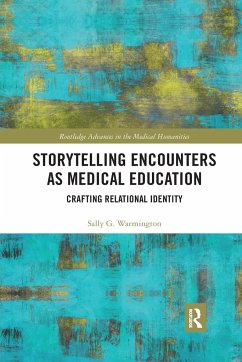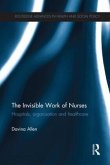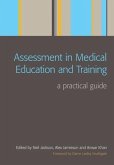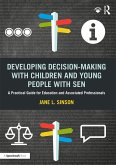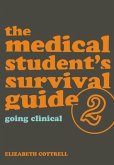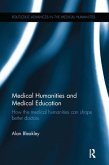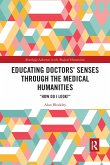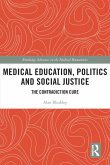This innovative volume provides fresh perspectives on how medical students and patients construct identities in relation to each other, using stories of their clinical encounters. It explores how paying attention to medical students' and patients' stories in clinical teaching encounters can encourage empathy and the formation of professional identities that embody desirable values such as integrity and respect.
Written by an experienced clinician and based on original, rigorous research combining ethnography and dialogic narrative analysis, Storytelling Encounters as Medical Education: Crafting Relational Identity includes patient stories alongside those of students and clinical teachers.
This is an important contribution for all those interested in medical education, narrative medicine, person-centred care and identity formation in healthcare. It will also be of value to scholars in a range of other disciplines, who are using a dialogic approach.
Written by an experienced clinician and based on original, rigorous research combining ethnography and dialogic narrative analysis, Storytelling Encounters as Medical Education: Crafting Relational Identity includes patient stories alongside those of students and clinical teachers.
This is an important contribution for all those interested in medical education, narrative medicine, person-centred care and identity formation in healthcare. It will also be of value to scholars in a range of other disciplines, who are using a dialogic approach.
A Choice Recommended title
'In a field blooming with new talent, Sally Warmington, an experienced doctor and innovative academic researcher, has written an outstanding book. She links the development of medical students' identities with how they listen to, facilitate, and manage the stories that patients tell about their illnesses, thereby 'crafting relational identity'. The book offers a framework for crafting a patient-centred practice through deliberate listening. This engaging book is a 'must read' not only for clinicians and clinical educators, but also for practitioners and researchers in any discipline keen to learn about the construction of relational identity and how this can be researched.'
Alan Bleakley, Emeritus Professor of Medical Education and Medical Humanities, University of Plymouth Peninsula School of Medicine, United Kingdom
'This is a compelling and authoritative read on medical teaching, learning and identity. The authentic voice of the author guides us through the theoretical and methodological aspects of her research before taking us out into the field. There, important insights are revealed through meticulous but lively analysis of stories from clinical teaching episodes, featuring the seldom-heard patient story. Both moving and enlightening, these stories build the author's irresistible case for raising the status of patients' voices to transform clinical teaching. I anticipate that this book will be enjoyed and valued by curriculum developers, clinical teachers and medical education scholars.'
Dr. Jenny Barrett, Senior Fellow (Honorary), Medical Education, The University of Melbourne, Australia
'Inspired by Bakhtin's theory of Dialogue, Sally Warmington introduces a radical intervention in the discourse of medical education and clinical practice to underscore the compelling significance of stories and narratives in the field. The Author expertly explores the complexity surrounding patient-doctor interaction and weaves these insights into diverse conceptual and concrete aspects of the discipline. Especially noteworthy is the accessible, jargon-free voice of the Author, which crafts a dialogic relationality with readers, across disciplines and borders. This book, enriched with rigor, integrity and authenticity, is undoubtedly a welcome contribution toward opening deeper Dialogues.'
Dr Mahtab Janfada, Lecturer, Language and Literacy Education, Melbourne Graduate School of Education, The University of Melbourne, Australia
'Sally Warmington is an accomplished clinician with an established and intricate understanding of the clinical encounter. This scholarly book, based on her empirical research, examines the clinical encounter from the perspectives of those participating in Dornan's clinical learning triad: the patient, medical student and doctor. Applying a theoretical framework derived from the work of Bakhtin and Kristeva, she effectively uses storytelling to examine the different perspectives of the triad protagonists, particularly that of the patient. The insights she provides in this important work are essential reading for all of those involved in health professional education. I commend it most highly.'
Professor Geoff McColl, Executive Dean, Faculty of Medicine, The University of Queensland, Australia
'This is a unique and powerful ethnography of student-patient-teacher encounters in Australian hospitals. The book makes a compelling case for a shift in medical education from a largely doctor centred, monological approach to a dialogical curriculum. Using Bakhtin's concept of dialogue, Warmington invites us to open our eyes and ears - and those of our students - to the identity work patients do through storytelling about their individual illness experiences. Through a rich tapestry of narrative, interpretation and scholarly review, Warmington provides an accessible and redemptive guide to how we can support the development of the patient centred doctors that our societies are crying out for.'
Professor Peter Cantillon, Professor of Primary Care and Head of Department of General Practice, National University of Ireland Galway, Ireland, Chair and Co-Founder of the Irish Network of Medical Educators
'This is an extraordinarily insightful book on how students become doctors. We know that role modelling by senior doctors is an important influence on students, but the original research underpinning this book reveals how doctors' interactions with patients can impact so powerfully on the watching student. Dr. Warmington reveals the hidden backstories of patients and students, and how they attempt to make sense of their mutual clinical interactions; specifically, how each strategically presents themselves to each other to illustrate just what sort of person (or doctor) they wish to be. This book will become essential reading for all doctors and clinical teachers who interact with students.'
Associate Professor Hamish Wilson , Otago Medical School , University of Otago, Dunedin, New Zealand
'I think this book would be useful to medical educators and researchers for several reasons. You will be introduced to literature about important topics in medical education, like professional identity formation. You will follow an educational researcher at fieldwork in a teaching hospital, and hear stories about consenting practices from patients, students and teachers, calling for ethical reflection about patients as learning objects. Through a dialogical analysis of the stories, you will discover more about what is at stake, identity-wise, for all actors. Ultimately, the book is pleading for a humanization of medical practice and medical education.'
Dr May-Lill Johansen, Department of Community Medicine, , Faculty of Health Sciences,
Arctic University of Norway, Tromsø, Norway
'Sally Warmington takes us on an academic journey illustrating how encounters between medical students, educators and patients in their various roles are storied as part of their identity work. Not only is her book a 'must read' for anyone interested in the study of identities in general, acting as a wonderful 'how to' example of narrative research in action; but it is also a 'must read' for healthcare professional educators more widely, clarifying the everyday relational accomplishments of becoming a healthcare practitioner through workplace learning activities.'
Professor Lynn Monrouxe, Associate Dean for Work Integrated Learning, Faculty of Health Sciences, Work Integrated Learning, The University of Sydney, Australia
'At a time of expansive growth in medical technologies and virtual simulations, Sally Warmington reminds us of the importance and power of stories in medical education practice. Her rich ethnographic insights into the encounters between medical students and hospital patients point to a transformed medical education system that is dialogical, ethical and ultimately beneficial to the delivery of care in clinical settings.'
Associate Professor Richard Chenhall, Deputy Director, Centre for Health Equity & Head, Health Humanities and Social Science Unit, Melbourne School of Population and Global Health, The University of Melbourne, Australia
"Many readers in the target audience will find this useful, while most will thank the author for the absence of "hard science" pretense in her book. Summing Up: Recommended. Faculty and professionals."
P. Rodriguez del Pozo, Weill Cornell Medical College, CHOICE Review
'In a field blooming with new talent, Sally Warmington, an experienced doctor and innovative academic researcher, has written an outstanding book. She links the development of medical students' identities with how they listen to, facilitate, and manage the stories that patients tell about their illnesses, thereby 'crafting relational identity'. The book offers a framework for crafting a patient-centred practice through deliberate listening. This engaging book is a 'must read' not only for clinicians and clinical educators, but also for practitioners and researchers in any discipline keen to learn about the construction of relational identity and how this can be researched.'
Alan Bleakley, Emeritus Professor of Medical Education and Medical Humanities, University of Plymouth Peninsula School of Medicine, United Kingdom
'This is a compelling and authoritative read on medical teaching, learning and identity. The authentic voice of the author guides us through the theoretical and methodological aspects of her research before taking us out into the field. There, important insights are revealed through meticulous but lively analysis of stories from clinical teaching episodes, featuring the seldom-heard patient story. Both moving and enlightening, these stories build the author's irresistible case for raising the status of patients' voices to transform clinical teaching. I anticipate that this book will be enjoyed and valued by curriculum developers, clinical teachers and medical education scholars.'
Dr. Jenny Barrett, Senior Fellow (Honorary), Medical Education, The University of Melbourne, Australia
'Inspired by Bakhtin's theory of Dialogue, Sally Warmington introduces a radical intervention in the discourse of medical education and clinical practice to underscore the compelling significance of stories and narratives in the field. The Author expertly explores the complexity surrounding patient-doctor interaction and weaves these insights into diverse conceptual and concrete aspects of the discipline. Especially noteworthy is the accessible, jargon-free voice of the Author, which crafts a dialogic relationality with readers, across disciplines and borders. This book, enriched with rigor, integrity and authenticity, is undoubtedly a welcome contribution toward opening deeper Dialogues.'
Dr Mahtab Janfada, Lecturer, Language and Literacy Education, Melbourne Graduate School of Education, The University of Melbourne, Australia
'Sally Warmington is an accomplished clinician with an established and intricate understanding of the clinical encounter. This scholarly book, based on her empirical research, examines the clinical encounter from the perspectives of those participating in Dornan's clinical learning triad: the patient, medical student and doctor. Applying a theoretical framework derived from the work of Bakhtin and Kristeva, she effectively uses storytelling to examine the different perspectives of the triad protagonists, particularly that of the patient. The insights she provides in this important work are essential reading for all of those involved in health professional education. I commend it most highly.'
Professor Geoff McColl, Executive Dean, Faculty of Medicine, The University of Queensland, Australia
'This is a unique and powerful ethnography of student-patient-teacher encounters in Australian hospitals. The book makes a compelling case for a shift in medical education from a largely doctor centred, monological approach to a dialogical curriculum. Using Bakhtin's concept of dialogue, Warmington invites us to open our eyes and ears - and those of our students - to the identity work patients do through storytelling about their individual illness experiences. Through a rich tapestry of narrative, interpretation and scholarly review, Warmington provides an accessible and redemptive guide to how we can support the development of the patient centred doctors that our societies are crying out for.'
Professor Peter Cantillon, Professor of Primary Care and Head of Department of General Practice, National University of Ireland Galway, Ireland, Chair and Co-Founder of the Irish Network of Medical Educators
'This is an extraordinarily insightful book on how students become doctors. We know that role modelling by senior doctors is an important influence on students, but the original research underpinning this book reveals how doctors' interactions with patients can impact so powerfully on the watching student. Dr. Warmington reveals the hidden backstories of patients and students, and how they attempt to make sense of their mutual clinical interactions; specifically, how each strategically presents themselves to each other to illustrate just what sort of person (or doctor) they wish to be. This book will become essential reading for all doctors and clinical teachers who interact with students.'
Associate Professor Hamish Wilson , Otago Medical School , University of Otago, Dunedin, New Zealand
'I think this book would be useful to medical educators and researchers for several reasons. You will be introduced to literature about important topics in medical education, like professional identity formation. You will follow an educational researcher at fieldwork in a teaching hospital, and hear stories about consenting practices from patients, students and teachers, calling for ethical reflection about patients as learning objects. Through a dialogical analysis of the stories, you will discover more about what is at stake, identity-wise, for all actors. Ultimately, the book is pleading for a humanization of medical practice and medical education.'
Dr May-Lill Johansen, Department of Community Medicine, , Faculty of Health Sciences,
Arctic University of Norway, Tromsø, Norway
'Sally Warmington takes us on an academic journey illustrating how encounters between medical students, educators and patients in their various roles are storied as part of their identity work. Not only is her book a 'must read' for anyone interested in the study of identities in general, acting as a wonderful 'how to' example of narrative research in action; but it is also a 'must read' for healthcare professional educators more widely, clarifying the everyday relational accomplishments of becoming a healthcare practitioner through workplace learning activities.'
Professor Lynn Monrouxe, Associate Dean for Work Integrated Learning, Faculty of Health Sciences, Work Integrated Learning, The University of Sydney, Australia
'At a time of expansive growth in medical technologies and virtual simulations, Sally Warmington reminds us of the importance and power of stories in medical education practice. Her rich ethnographic insights into the encounters between medical students and hospital patients point to a transformed medical education system that is dialogical, ethical and ultimately beneficial to the delivery of care in clinical settings.'
Associate Professor Richard Chenhall, Deputy Director, Centre for Health Equity & Head, Health Humanities and Social Science Unit, Melbourne School of Population and Global Health, The University of Melbourne, Australia
"Many readers in the target audience will find this useful, while most will thank the author for the absence of "hard science" pretense in her book. Summing Up: Recommended. Faculty and professionals."
P. Rodriguez del Pozo, Weill Cornell Medical College, CHOICE Review

